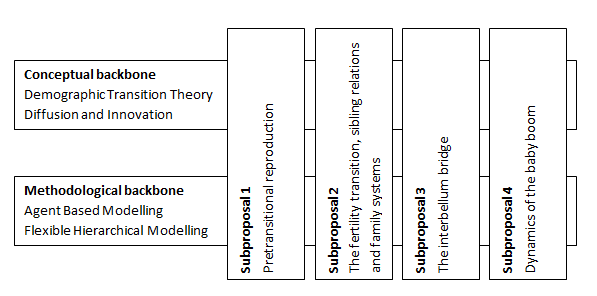Published on Mon, 2013-02-11 08:40
NEW APPROACHES TO THE SOCIAL DYNAMICS OF LONG-TERM FERTILITY CHANGE
Promotor: Koen Matthijs
Copromotors: Erik Buyst, Geert Molenberghs, Jan Van Bavel, Geert Verbeke
During the past two centuries, populations have experienced remarkable changes in fertility, with new types of behavior often spreading rapidly across disparate social groups and regions. Evidence clarifying the complex dynamics of individual (non-)decision-making within, and influenced by evolving and overlapping social networks requires the development and application of cutting-edge modelling techniques to rich data sources that include economic, cultural and socio-demographic factors at the individual and aggregate levels.
An interdisciplinary team of sociologists, historians, and applied statisticians will collaborate on methodological dimensions of the project. The specific aim is to improve procedures for hierarchical modeling. Fertility choices are made within the context of concurrent, interacting processes (labor market decisions, social mobility, migration), and the still unexplored interactions between these processes require novel statistical models that can account for the spatial and temporal structure using extensive data sources. KU Leuven and Radboud Universiteit Nijmegen have already compiled unique data bases of historical life courses, relevant to the core substantive questions.
A fundamental strand of the project will involve the development and application of agent-based modeling techniques (ABM), a simulation-based technique that can uncover how the behavior of individual agents, following specific rules and interacting with other agents, results in specific aggregate outcomes. ABM runs computational experiments to determine the best fit between individual behavioral rules (e.g., fertility norms by religion, chance to remain childless by social group, etc.), the type and intensity of interaction (e.g., willingness to adapt the behavior of social superiors, propensity to learn from peers in the workplace), the feedback loops running from the macro to the micro-level, and the empirical, aggregate outcomes.
In the course of exploring the mechanisms of fertility transition over more than 150 years, this research will deliver an advanced toolkit for the study of socio-demographic processes that will reinforce KU Leuven’s international prominence and visibility in this research domain. The analytical developments will provide a platform from which the role of social interaction processes in both historical and contemporary fertility changes can be explored.
Schematic representation of the project design:

